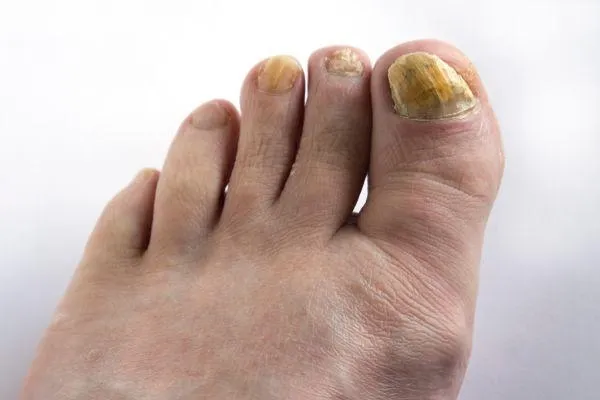
Thickened Toenails: How to Identify, Treat, and Prevent Them
Have you noticed that one (or more) of your toenails has become thicker than usual? Thickened toenails are a common issue, but they can be more than just a cosmetic concern. They can cause discomfort, make it harder to find shoes that fit properly, and even lead to other foot problems if left untreated. In this post, we’ll explore how to identify thickened toenails, what causes them, and how to treat and prevent them.
What Are Thickened Toenails?
A thickened toenail is exactly what it sounds like: a toenail that has grown thicker and denser than usual. This condition is most commonly seen on the toenails, especially the big toe, and it can affect one or multiple nails. In addition to the obvious thickening, the nail may become discoloured, brittle, or misshapen, which can cause discomfort and pain when walking or wearing shoes.
Causes of Thickened Toenails
There are several potential causes for thickened toenails, including:
Fungal Infections (Onychomycosis)
One of the most common causes of thickened toenails is a fungal infection. Fungal infections can cause the nail to thicken, discolour (usually yellow or brown), and become brittle. The infection can spread and worsen if not treated promptly.Trauma or Injury
Repeated trauma or injury to the toenail (such as stubbing the toe or wearing tight shoes) can lead to thickening. Over time, the nail may begin to grow abnormally as a result of the repeated pressure.Poor Nail Care
Improper nail trimming or neglecting proper foot hygiene can contribute to thickened toenails. This is especially true if the toenail is consistently cut too short or left untrimmed, causing irritation or infection.Aging
As we age, our toenails naturally become thicker and more brittle. This change can be exacerbated by other health issues, such as poor circulation or diabetes.Psoriasis
Psoriasis is a chronic skin condition that can also affect the nails, leading to thickening, discoloration, and crumbling. In some cases, the thickened nail may develop pits or grooves.Circulation Issues
Poor circulation can affect the health of your toenails. When blood flow to the feet is compromised, it can lead to changes in the texture and thickness of the toenails.
How to Identify Thickened Toenails
Thickened toenails are relatively easy to identify, but if you're unsure whether your toenail is thickened or affected by a condition like fungal infection, here are some key signs to look for:
Increased thickness of the nail
The nail will appear thicker than normal, especially near the edges or at the base.Discoloration
Thickened nails may become yellow, brown, or even black due to fungal infections or trauma.Brittle texture
The nail may become brittle and start to break or crack more easily.Pain or discomfort
If the toenail is pressing against the surrounding skin or causing irritation, it may result in pain, redness, or swelling.Misshapen appearance
The nail may grow in a distorted way, with ridges or bumps, especially if the thickening is caused by psoriasis.
Treatment for Thickened Toenails
The treatment for thickened toenails largely depends on the underlying cause. Here are some common treatments:
Antifungal Medications
If the thickening is caused by a fungal infection, antifungal creams or oral medications may be prescribed to clear the infection. In some cases, topical antifungal treatments may be enough to reduce thickness and restore the nail's appearance.Nail Debridement
For nails that are particularly thick and painful, a podiatrist may recommend professional debridement. This involves safely trimming away the thickened portion of the nail to relieve discomfort and allow for healthier growth.Topical Treatments for Psoriasis
If psoriasis is the cause, topical creams and treatments designed to manage skin conditions can help reduce inflammation and improve the nail's appearance.Surgical Intervention
In extreme cases where the toenail is causing significant pain or complications, surgical removal of the nail may be necessary. This is typically a last resort and is performed by a trained podiatrist.Improved Nail Care
Proper nail care, such as regular trimming, cleaning, and avoiding cutting nails too short, can help prevent further thickening. Be sure to wear comfortable, well-fitting shoes and keep your feet clean and dry to avoid complications.
Preventing Thickened Toenails
Preventing thickened toenails begins with good foot hygiene and care. Here are some tips to keep your toenails healthy and avoid thickening:
Wear the right shoes: Choose footwear that fits well and provides plenty of room for your toes. Tight shoes or shoes that apply pressure on the toes can cause injury and lead to thickened nails.
Practice good nail hygiene: Trim your toenails regularly, cutting them straight across to avoid ingrown nails and infections. Keep your nails clean and dry to prevent fungal infections.
Treat fungal infections early: If you notice any signs of a fungal infection, such as discoloration or brittleness, consult with a podiatrist right away for treatment.
Protect your feet from injury: Avoid stubbing your toes or subjecting your feet to repeated trauma that could lead to thickened nails.
Consult with a podiatrist: If you notice your toenails becoming thicker, brittle, or painful, it’s important to seek professional help to address the issue before it worsens.
Final Thoughts
Thickened toenails may seem like a minor issue, but they can cause pain, discomfort, and even lead to more serious foot problems if left untreated. By recognising the symptoms early, seeking appropriate treatment, and practising good foot care habits, you can maintain healthy toenails and avoid complications.
If you’re dealing with thickened toenails or any other foot-related issues, don’t hesitate to reach out to us at Coventry Foot Doctor. Our experienced team is here to help you get back on your feet—comfortably and confidently.
Contact us today to schedule an appointment or ask any questions you might have. We’re here to help you care for your feet every step of the way!
Ask Abid And His Team
Fill in the form to request a Call From Our Team
One of our team will call you for FREE and answer any questions or concerns you may have about your uncomfortable Foot Pain
© Copyright 2022. Biomechanix Clinic Ltd. All rights reserved.





